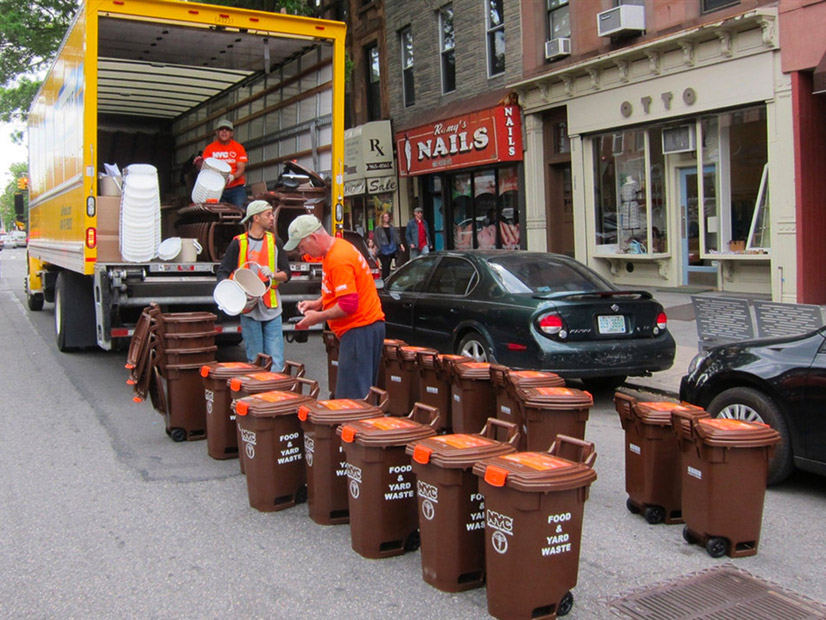Proposed rules for food donations and scraps recycling in New York have drawn some criticism.
Stakeholders want officials to improve definitions, impose documentation requirements and clarify certain rules in the proposed regulations for food scrap generators. The rules would require large food scrap generators to donate excess edible food and send scraps to an organics recycler if one is available within 25 miles.
“We definitely appreciate that facilities are able to say ‘no’ if they’ve reached capacity, and [we] encourage the ability to site new and more facilities so we can divert more organic waste from the waste stream,” Dereth Glance, executive director of the nonprofit Onondaga County Resource Recovery Agency, said Wednesday. Glance also is a member of the state Climate Action Council’s Waste Advisory Panel.
The Department of Environmental Conservation (DEC) in January proposed a rulemaking that would implement requirements outlined in the Food Donation and Food Scraps Recycling law with an effective date of Jan. 1, 2022. The DEC on Wednesday held two public hearings on the proposed rules, with final comments due April 27. (See NY Proposes Food Scrap Regs to Cut Waste, Emissions.)
Mind the Language
Meredith Danberg-Ficarelli, director of Common Ground Compost in New York City, said most of the proposed rules are reasonable and well-considered, but the section regarding the separation of food scraps for recycling (350-2.4(c)) encourages “a future littered with microplastics that favors industrial-scale processing over the interests of rural, urban and small- and mid-scale processors.”
The section says that generators are not required to separate food scraps if they send scraps for processing to “a solid waste composting facility, solid waste anaerobic digestion facility, or other organics recycler capable of managing the waste without source separation.”
“This language is insane,” Danberg-Ficarelli said. “Have you seen what comes out of an industrial depackaging machine processing mixed waste? It looks like wet, sloppy, food scrap meatballs filled with shreds of plastic packaging.”
Laura Feitner Calarco of L.K. McLean Associates, a Long Island engineering consultancy, wanted the DEC to ensure that any regulatory definitions have adequate references to enable them to apply under the proposed legislation.
“I can tell you from dealing with permitting of facilities, landfills and transfer stations and whatnot that as professionals we rely on these definitions quite a bit in dealing with your agency,” Calarco said.
George Davidson, representing the American Biogas Council, asked the DEC to clarify the approval process for combustion and beneficial reuse of biogas produced at organics recycling facilities.
“Our biogas system project developers need to know exactly what will be approved so that we can budget that and make the projects align,” Davidson said.
He also asked the agency to define the beneficial use of organic materials more concretely and to consider implementing a hierarchy for beneficial uses.
In addition, Davidson said the council’s wastewater treatment members are concerned about language (Section 350-2.3(b)4) allowing food scraps recyclers with an onsite grinder for volatile soft solids to put solids into the sewerage system.
“As a result, the wastewater treatment plant has to have a proportional amount of the biosolids recycled,” Davidson said. “That requirement is going to be difficult for treatment plants to fulfill, and we would like clarification on how the [DEC] expects them to determine that value.”
Feed the People
Steve Changaris, vice president for the Northeast Region at National Waste and Recycling Association, said the association endorses the law and the regulations, and it is pleased that the law focuses on food donation.
“There is hunger and poverty, so feeding people is the highest and best use of this food,” Changaris said.
The state’s program hinges on participation by the waste generators, the largest of which may have to change some of their operational practices, he said.
“When we present ourselves to customers to do this work, they’re going to have a lot of questions, and having DEC-issued lists and informational flyers about this program will help us educate them,” Changaris said.
Caroline Parker, legal intern with New York Lawyers for the Public Interest (NYLPI), said that while the regulations will not directly apply to food scraps generated in the city, they will affect the statewide infrastructure for transportation, processing and recycling.
New York City has run several composting and recycling programs since 2012 aimed at eliminating waste by 2030 through reuse, pay-as-you-throw trash collection and greater recycling of textiles and electronics.
“Food waste is a quintessential environmental justice issue,” Parker said. “And food makes up nearly one-fifth of New York’s solid waste stream, the majority of which is hauled by trucks to landfills or incinerators.”
NYLPI asked the DEC to encourage community-scale recycling and require documentation to make sure that food waste does not end up in landfills.






